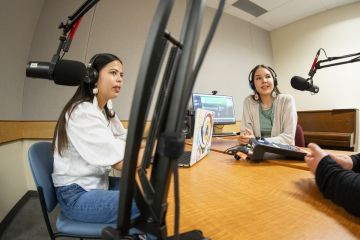Backgrounder: National centre for Indigenous law and reconciliation at UVic
The world’s first Indigenous law degree program
The Indigenous law program—the world’s first joint-degree in Indigenous law—had its first intake of 26 students in September 2018.
The Joint Canadian Common Law and Indigenous Orders degree will give graduates two professional degrees: Juris Doctor (JD) and Juris Indigenarum Doctor (JID).
The four-year program was conceived of and created by two of Canada’s most highly respected Indigenous legal scholars: John Borrows, Canada Research Chair in Indigenous Law; and Val Napoleon, Law Foundation Chair in Aboriginal Justice and Governance and ILRU director.
Graduates will impact areas such as environmental protection, Indigenous governance, economic development, housing, child protection and education—areas where currently there is an acute lack of legal expertise to create institutions that are grounded in Indigenous peoples’ law and to build productive partnerships across the two legal systems.
The program will help meet a rapidly increasing demand for legal professionals able to work across the two legal systems in Indigenous governance, in law firms that work with Indigenous peoples and Indigenous lands, non-Indigenous government agencies and business enterprises.
Indigenous Law Research Unit
The Indigenous Law Research Unit (ILRU), led by Val Napoleon, is Canada’s leading research institute on the law of Indigenous peoples. It works to redefine Canadian law so that Indigenous legal traditions are re-established and given equal footing with common law.
Some of these major current and past research collaborations include:
- Water law project: water stewardship and watershed management research exploring how Indigenous communities and licensed water users in the agriculture and utility sector use water in the context of both Indigenous and Canadian law.
- Kipimoojikewin ("the things we carry with us"): How Anishinaabe Law Upholds Local Governance
- Tsimshian Inter-nation Co-operation and Dispute Resolution
- Kwseltkten: Secwepemc Citizenship Law
- Indigenous Governance and Citizenship: Developing a Collaborative ILRU Methodology
- Tracking Change - The Role of Local and Traditional Knowledge in Watershed Governance
- Revitalizing Law for Land, Air and Water Project
Response to the TRC
This national centre for Indigenous law and reconciliation is fundamental to the fulfillment of Calls to Action numbers 27, 28 and especially 50 of the Truth and Reconciliation Commission:
“In keeping with the United Nations Declaration on the Rights of Indigenous Peoples, we call upon the federal government, in collaboration with Aboriginal organizations, to fund the establishment of Indigenous law institutes for the development, use, and understanding of Indigenous laws and access to justice in accordance with the unique cultures of Aboriginal peoples in Canada.”
Senator Murray Sinclair, former judge and Chief Commissioner of the TRC, said of the centre for Indigenous law and reconciliation and the joint JD/JID program:
“They are precisely what we had hoped would follow from the report of the Truth and Reconciliation Commission, and they promise to form the very best of legacies: a set of initiatives that reject and reverse the pattern of denigration and neglect identified in our report, and that establish the conditions for effective action long into the future.”
-- 30 --
Follow us on Twitter: @uvicnews
UVic media relations & services: www.uvic.ca/communicationsmarketing/media
In this story
Keywords: indigenous, law, funding, National Centre for Indigenous Laws
People: Val Napoleon, John Borrows




